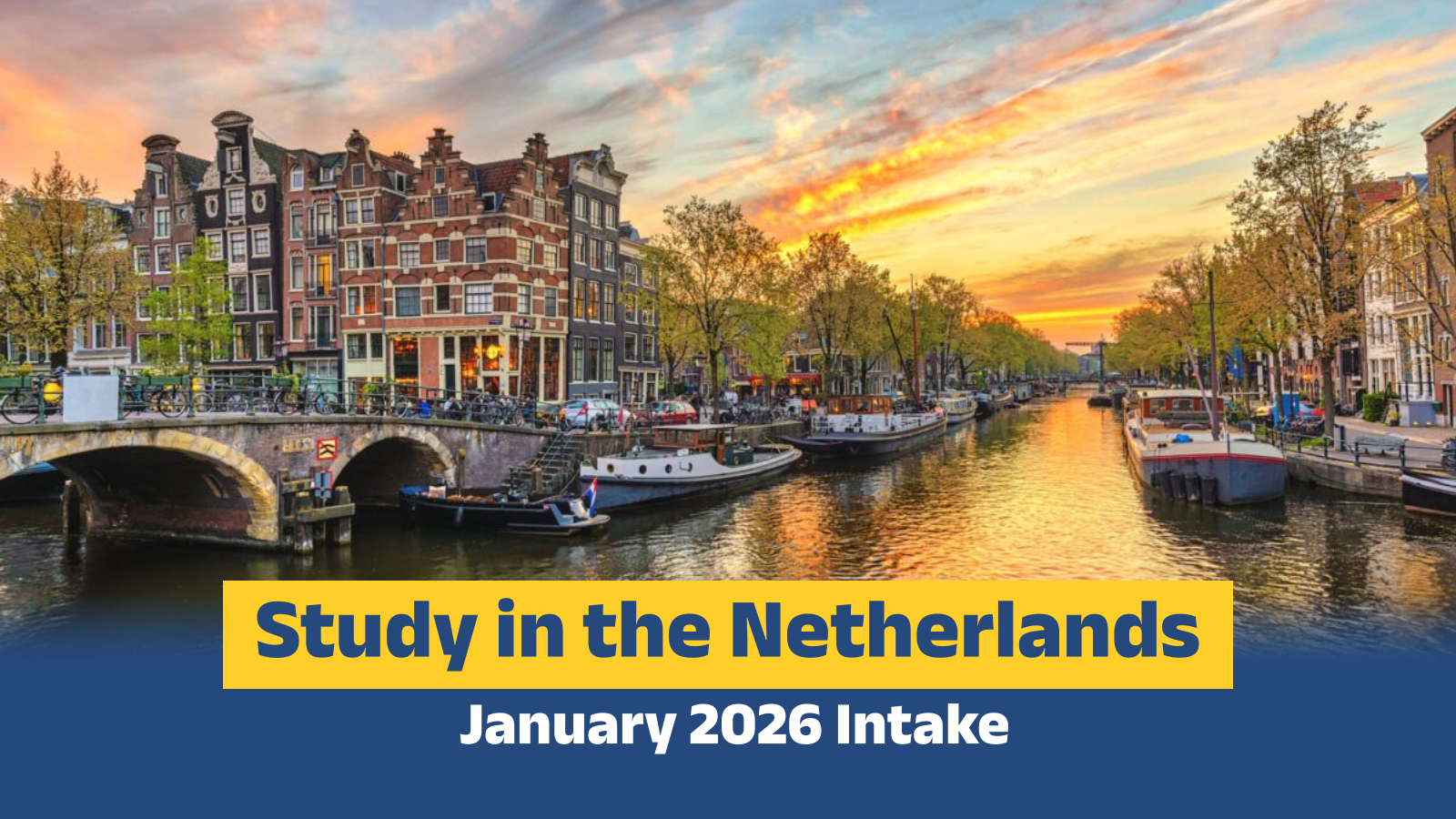Europe continues to attract ambitious Indian students seeking world-class education, global exposure, and promising career opportunities. Among European destinations, the Netherlands stands out for its high academic standards, English-taught programmes, favourable post-study options, and welcoming environment. If you are planning for the January 2026 intake, here is everything you need to know, visa deadlines, admission essentials, benefits, and tips.
Why Choose the Netherlands for Higher Education
The Netherlands has several attributes that make it a preferred destination for Indian students:
English-taught programmes: Many bachelor’s and master’s level courses are fully in English, easing the transition and allowing you to focus more on your field of study.
Affordable tuition and cost of living (relative to other Western European countries) when well budgeted.
High visa success rate for Indian students if application and documentation are complete and well-prepared.
Part-time work during studies (subject to limitations), which helps with experience and supporting living expenses.
Post-study work visa / Orientation Year permit (“zoekjaar”): after graduation you get up to one year to stay, work, or start a business.
Key Dates & Deadlines for January 2026 Intake
Visa application deadline: Students must typically apply for the Netherlands student visa well in advance. For the January 2026 intake, the suggested deadline to apply for the student visa is 15 October 2025. Having everything ready early — admission offer, proofs, and financial documentation — will help avoid last‐minute issues.
Admission deadlines at universities also vary: some may close admission earlier than this visa deadline. Always check individual university portals.
Visa & Residence Permit Requirements
Here’s what Indian students need to know about getting the student visa/residence permit:
Student Residence Permit (MVV / VVR)
Indian nationals must usually apply for a Long-Stay Visa (MVV) along with a student residence permit (VVR) after obtaining admission to a recognized Dutch university or higher professional education institution.
The university or institution you’ll attend must be an accredited sponsor recognised by the Dutch Immigration and Naturalisation Service (IND).
Documents & Proofs
Some of the common required documents include:
Valid passport, passportsize photos, and proof of admission/offer letter.
Academic transcripts, prior qualifications.
Proof of funds: showing you have enough money to live in the Netherlands (amounts are reviewed; Indian students often need to show monthly living cost estimates).
English language proficiency (e.g., IELTS, TOEFL) as per university requirement.
Health insurance, sometimes travel insurance initially.
Possibly TB test or medical checks, depending on specifics.
Fee and Processing
The visa fee (MVV / residence permit) for Indian students is about €207 (this may vary) for a long stay/student residence permit.
Processing times vary: universities often submit the visa/residence permit applications to IND, and it takes some weeks. Start early to avoid delays.
Post-Study Work & Career Opportunities
One of the Netherlands’ biggest draws is its favourable post-study work policy.
Orientation Year (Zoekjaar Permit): After graduation, you can apply for a one-year residence permit which allows you to work in any job (full-time), search for employment, or even start your own business. No need for a separate work permit for that year.
You must apply within three years of completing your degree.
This year gives you the flexibility to settle in the Dutch labour market, find appropriate job roles (especially in sectors like tech, finance, engineering), or pivot to a “highly skilled migrant” visa if you meet criteria.
Benefits & Challenges: What to Expect
Benefits
High-quality education with strong industry links and research facilities.
Multicultural environment, exposure to global peers.
Good infrastructure, public transport, and healthcare systems.
Work during studies: you can work part-time (often up to ~16 hours/week) and full-time during holidays.
Strong graduate employability and globally respected degrees.
Challenges
Accommodation shortage in many cities. Students often find it hard to secure housing. Advance planning is essential.
Cost of living: While tuition may be reasonable compared to some English-speaking countries, housing, transportation, food, and general expenses add up.
Language barrier outside academia: Dutch language skills help in daily life and in the job market for many roles, although many companies use English.
Tips for Indian Students Applying for January 2026
Begin research now: shortlist universities, courses, and check their January intake deadlines.
Prepare financial documents early: bank statements, proof of funds, scholarships, etc.
Check English proficiency requirements well in advance. If IELTS/TOEFL is needed, schedule exams with buffer time.
Secure accommodation as soon as you confirm admission; start looking early due to high demand.
Maintain good academic records—some residence permit criteria require you to make sufficient progress in your studies.
Familiarize yourself with IND guidelines via the official site, for the latest updates.
Conclusion
If you’re aiming for the January 2026 intake in the Netherlands, now is the time to act. From getting your admission offer, arranging finances, to submitting visa/residence permit applications well before the deadline — early preparation is key. The combination of world-renowned education, excellent post-study opportunities, and a student-friendly environment makes the Netherlands a smart choice for Indian students.
Frequently Asked Questions (FAQs)
Can I work part-time while studying?
Yes. International students are generally permitted to work up to 16 hours per week during term time, and full-time during holidays.
How soon after graduation must I apply for the Orientation Year visa?
Within three years of completing your studies.
How much living costs should I show proof for?
You will need to show proof that you can cover monthly living expenses; amounts vary by city. Some sources say around €850-€950/month or more, depending on lifestyle.
What if my university is outside the Netherlands but ranked highly?
Under certain conditions, graduates from universities abroad (if they are in top global rankings, designated institutions) may also be eligible for the Orientation Year permit.



